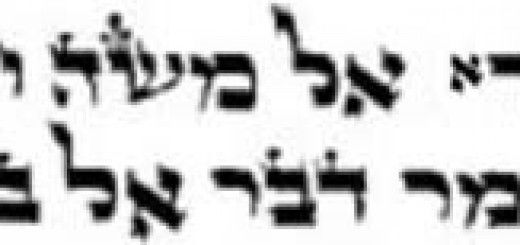By Avner Friedmann
The Parsha opens with the words[1]: “Hashem spoke to Moshe, saying: Speak to the Children of Israel and let them take a portion (Terumah) for Me; from every man whose heart motivates him you shall take My portion”. This verse refers to the contributions to the Tabernacle. The Baal HaTurim points out that the word “Terumah”- תרומה, has an additional meaning.
In the Holy Language (Biblical Hebrew) when the letters of this word are rearranged they spell Torah-תורה , plus the letter ‘m’ (מ), which is the numerical value of 40. In other words, “Terumah” represents the Torah itself, which was given at Mount Sinai in forty days. The Midrash[2] tells us that there is no greater portion than Torah and it illustrates this with a story:
Once a group of import-export merchants were on a sea voyage; each transporting his merchandise to market. During the trip the merchants proudly displayed and extolled their merchandise to each other. Now, there happened to also be a Torah scholar on board. Thinking he too was a merchant, they asked to see his merchandise. He replied, “It is on board, but it is hidden. I’m sorry, but I cannot show it to you”. They searched through the cargo, but could not find his merchandise, so they then began to ridicule him. However he replied, “When we reach shore, I’ll show you”.
Soon afterwards, pirates attacked and commandeered the ship. They sailed to the closest beach, forced all the passengers to disembark and took off with the ship and all its cargo. The merchants, left with nothing but the shirts on their backs, wandered to the nearest town. They were absolutely penniless and had to beg for alms to survive.
In the meantime, the Torah scholar located the local Beit HaMidrash (House of Learning) and joined in their studies and Torah discussions. It did not take long for the local Jews to realize his great wisdom and tremendous Torah knowledge and in short order they made him their Judge and Rabbi. Of course, this came along with all the benefits of his new position. The merchants however, were still destitute and living in rags.
One day they recognized him as he came out of the Beit HaMidrash accompanied by his devoted students and congregants. They approached and asked, “How did you manage to be appointed to this important position?” “By selling my merchandise of course”, he replied. “I told you I would show you once we were on shore”.
“My merchandise is far more precious than yours. It is in my heart and mind and accompanies me wherever I go. I will never lose it because it is the only merchandise that lasts forever. Your merchandise, on the other hand, does not count for very much, even in this world, as it can easily be lost. You need to guard your merchandise, but my merchandise guards me”.
As a rule, when a person acquires a commodity, he can either profit from it or lose from it. However if he acquires Torah he only can gain. Moreover, not only does he profit in this world, but he also gains in the World to Come, as it is written[3]: “For I have given you a good portion, do not forsake My Torah”. The Holy One Blessed Be He says to every Jew, “The Torah is Mine. Take it, because when you do, you are taking Me along with it. Ultimately, Torah and mitzvot are the only things we can take with us when we leave this world, as our Parshah states, “Let them take a portion for Me”.
In this world, true goodness can only be accomplished through Torah and mitzvot. The Torah states[4]: “So that your days will be lengthened and so that it will be good for you, upon the land that Hashem your G-d, gives you”. According to our Rabbis in this verse[5] the Torah promises the World to Come to all those who follow it; a world of all goodness for eternity.
This world is comparable to a brief voyage on a ship. There are many “merchants” on board, each one trying to sell us his merchandise. However, whatever of this world we acquire is ultimately lost. The only acquisition that stays forever is the Torah that we’ve learned and the mitzvoth that we’ve done. Ultimately, this alone is the merchandise that really counts.





















